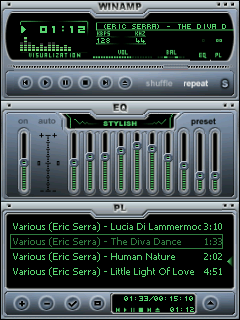It’s always nice to plop down to a big bowl of hot dog food and read about how the company you work for (ostensibly and/or on paper) squandered one of the most recognizable brands in PC history. As you’ll recall, the turn of the century was a time of great confusion. iTunes hadn’t yet rolled over the media space and these new M-P-3 files* were quite popular, yet no one knew how to play them. Enter WinAmp.
Ars, to their credit, wrote an excellent exposé on WinAmp, talking to the folks who made the company what it was – and who left to allow the company to degenerate into what it is now. The creators, Rob Lord and Justin Frankel, built WinAmp as a solution to play the nascent MP3. “Winamp grew out of wanting a good, enjoyable way to listen to MP3s on a computer. It wasn’t the first MP3 player, but the MP3 players around before it were hard for me to want to use,” Frankel told Digital Tools.
AOL bought WinAmp (and Nullsoft) for about $100 million. Lord and Frankel, forced to work inside the confines of AOL’s comparatively rigid structure, both quit and the app languished and was soon eclipsed by other solutions.
WinAmp still exists – a Mac version has been in beta since 2011, if that tells you anything about the pace of development – and presumably there are still some die-hards and altakakas who haven’t gotten the memo. In its heyday, the app had 60 million users and when AOL acquired the company they stuck them in with another property, Spinner, and began mucking about with leadership roles and business responsibilities. In short, they bought two disparate companies (Spinner was an Internet radio startup), put them together in a room, and asked them to fight it out. Neither survived.
I like to think we’re past that insane stage of company acquisitions and, to date, AOL hasn’t said word one about who is supposed to sit where under what manager. Maybe the Blue Lady learned her lesson or maybe nobody upstairs cares. Either way, it’s interesting to see another company ground to a pulp by the machinery of business and it’s a fascinating case study on how not to acquire an organic, vibrant, and ultimately doomed company.
*As a fun aside, I remember the actual day I heard about MP3s in college. It was something like March of 1996 and I was at Carnegie Mellon. I was buying all kinds of CDs and I didn’t own an MP3 player until, I think, 2002. I was talking about music with a buddy Roy and he said “Oh, I like to rip my own music” and I wondered what that meant. “I rip it into MP3 and play it back on my computer.” “What’s MP3,” I asked. “It’s an MPEG4 audio codec,” I think he said. It was like hearing about the wheel for the first time, or fire. It was that jarring a concept.
